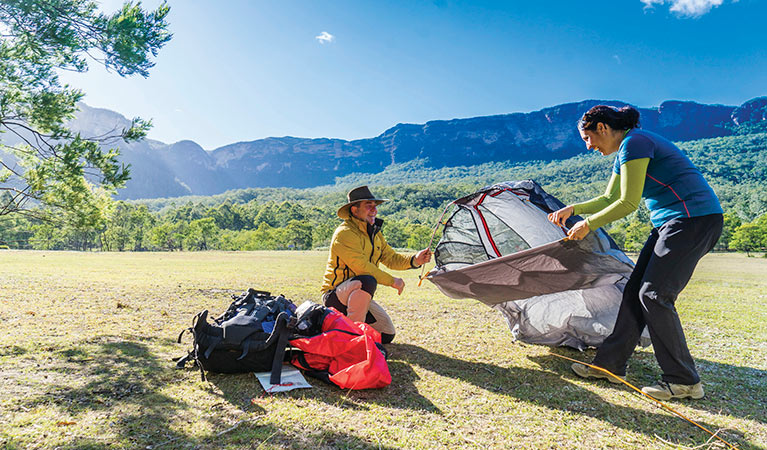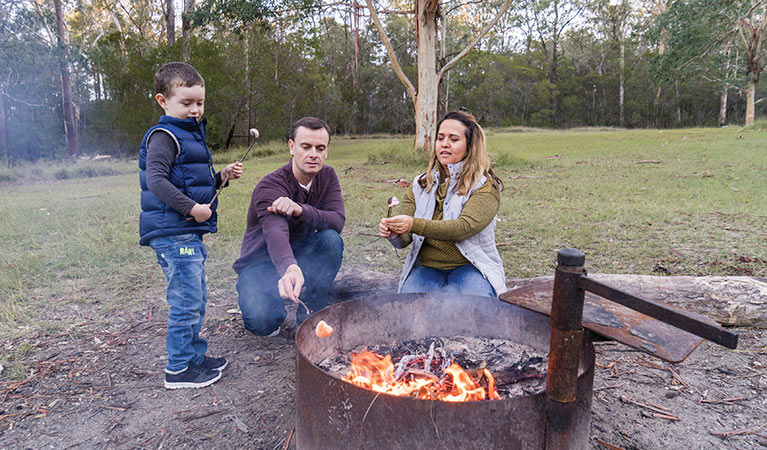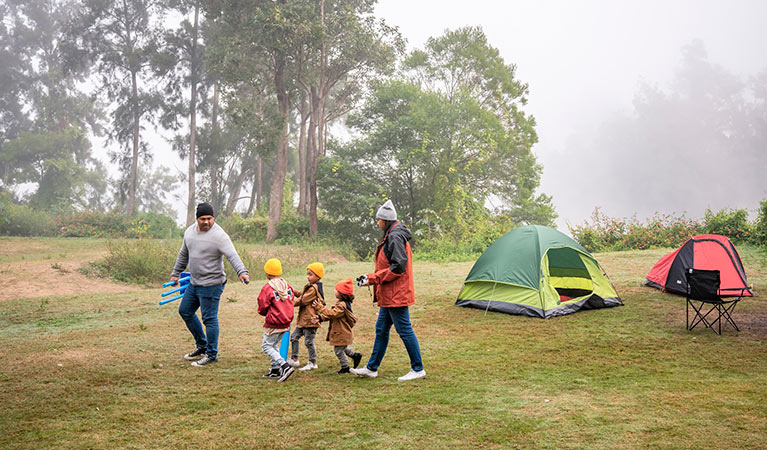Camping safety
Camping is a fun way to discover the beauty of our national parks. In NSW national parks, camping and overnight stays are usually restricted to within the boundaries of a campground. Follow these safety tips to keep you and your camping group safe.
Plan and book your camping trip
- You need to book in advance if you plan to stay at a NSW national parks campground or campsite.
- Find and book a campground from our list of popular sites.
- Designated camping areas within NSW national parks vary from park to park, and wild or back country camping is permitted in some national parks. Allow enough time to walk in and out of remote areas.
- Check park alerts or closures and the Hazards Near Me app before you go.
- Download the Emergency Plus app to your mobile or satellite phone. Be aware that mobile reception may not be available.
- Check the weather forecast. Ensure the road and campsite caters for your vehicle and equipment. You may not be able to reach the campground in wet weather.
- Drinking water isn’t available at most campgrounds. Check before you arrive.
- Plan ahead to reduce your risk of animal bites including leeches, ticks and mosquitoes which can carry viruses. Advice on mosquito bite prevention can be found on the NSW Health website.
- Bring a first aid kit.
- Check that your camping equipment is in working order.
Wild or back country camping
- You don't need to make a booking for remote camping (campgrounds that are not listed on this website), but we highly recommend you fill in a trip intention form before you arrive.
- If you're camping remotely in Kosciuszko National Park's Main Range, read our need-to-know information for a safe and enjoyable back country adventure.
Tell somebody
Give your trip details to family and friends who are not travelling with you. Tell them when you expect to return and let them know when you have returned. For longer trips or remote areas, filling in a trip intention form is highly recommended so make sure you complete one before leaving home and consider taking a personal locator beacon (PLB).
Where to set up camp
- When you arrive, check signage on the ground to see where camping is permitted.
- If you have booked a specific campsite, go to your reserved camping spot.
- When setting up your camp remember to look up to ensure there aren't any loose, dead or overhanging tree limbs.
- To protect the land at remote or undesignated camping areas, avoid camping on low or poorly drained areas where soil or vegetation may be easily damaged. Look for higher ground or sandier soils.
- Campsites are often adjacent to rivers, lakes and creeks that are unfenced. Take care in these locations. Camp above flood and tide debris, don’t camp in dry creek beds or road drains and always supervise children.
Campfires
- Follow all fire safety information during park fire bans and total fire bans and download the Hazards Near Me app especially in summer.
- Only light fires in designated fireplaces. Campfires may not be permitted in all parks, check before you go.
- Never leave fires unattended. Completely extinguish all fires before you leave an area or go to sleep.
- Campfires should not be used to incinerate rubbish. Fire doesn't destroy aluminium foil, and plastics release toxic gases when burned.
- Dead wood provides valuable habitat for native animals. Don’t break branches or collect fallen timber for fires. Check with the local office if you need to bring your own firewood.
- If you're camping off the beaten track, use a fuel stove. If you do need to light a fire, please remove the top layer of soil before making the fire. Keep the fire small and ensure you put the fire out thoroughly, scatter the ashes, and replace the top layer of soil.
- The use of chainsaws is not permitted.
Cooking and heating
- Never use gas stoves or fuel burners to heat your tent.
- Never cook inside a tent or enclosed camping spaces.
- Carbon monoxide poisoning can occur from combustion of fuels such as petrol, oil, gas and wood in areas with little or no ventilation, including tents and caravans. Read more about carbon monoxide safety.
- Don't use fuel or gas cookers next to an open flame or barbecue. They will explode.
Generator use
Limited use of generators is permitted in some NPWS campgrounds. To reduce the risk of wildfire:
- Never use generators during fire bans.
- Place the generator in an area clear of fuels, dry grass or other combustible material.
- Ensure extension leads do not cross access tracks and are rated for external use.
- Follow the manufacturer’s guidelines for safe operation of your generator.
- Only operate generators in well ventilated areas outside of tents and sleeping spaces.
- Be around whenever the generator is operating.
Drones
Drones are generally not permitted in busy visitor areas such as camping sites. You need a specific permit to use a drone.Be a considerate camper
The safety of other park visitors, native wildlife and the environment is important too. Domestic animals pose a danger to native animals and other visitors and are not permitted in most NSW national parks. Store food and rubbish in secure containers and away from animals. Never feed wild animals as they can get aggressive. Please leave your pet with a friend or family member. Read these tips on how to be a considerate camper.



